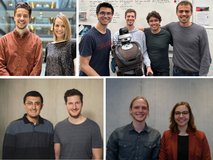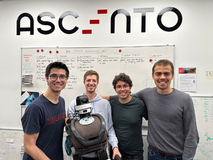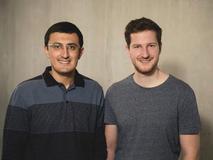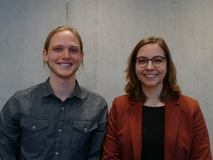Startups developing automated outdoor security patrolling, an app to communicate in style, AI-driven robotic manipulators for farmers, and the next generation heating of textiles each win CHF 10.000
28.11.2022
Ascento, eloqify, Floating Robotics and qCella win Venture Kick's first stage of financial and entrepreneurial support. Their projects offer a Robotics-as-a-Service for autonomous outdoor security patrolling, identify the unique linguistic style of a customer and tailor the communication to it, provide an off-the-shelf robotic manipulator with shears, cameras, an edge computer to harvest and de-leaf plants, and develop heating pads for the next-generation heating of textiles.
 |
 Ascento's team from left to right: Dominik Mannhart (Hardware & Design), Ciro Salzmann (Electronics & Software), Miguel de la Iglesia Valls (CTO), and Alessandro Mora (CEO & CBDO)
|
 eloqify's Sandro Arnet and Anne Scherer
|
 Floating Robotics's Salman Faraji (CEO) and Till Karbacher (Software Engineer)
|
 qCella's Fabian Schmid and Murielle Schreck
|
Ascento: Automated outdoor security patrolling
The global security market has USD 263 billion in annual revenue; however, it has low profitability (ca. 3% net margin) and low growth. This is not only because of very high production costs due to a “guard-focused” operating model, where labor costs alone account for around 80% of total sales; it is also because revenue growth has been subdued due to the immense difficulties in recruiting, onboarding, training, and retaining guards. It is so acute that incumbent security providers cannot serve all their customers due to a shortage of guards.
To tackle this challenge, Ascento offers a Robotics-as-a-Service for autonomous outdoor security patrolling. Ascento RaaS security solution includes three elements. Firstly, the Ascento robot can systematically and cost-efficiently patrol 24/7. Secondly, a technical support center, a cloud-based backend to monitor mission execution, and manually teleoperate the robot for specific patrols or inspections. And thirdly, the security analytics, AI, and machine learning capabilities to proactively prevent and detect security issues and automatically generate customer-specific security reporting (Ascento Security Solution). Ascento already kicked off its first pilot and has letters of intent validating the assumptions from major security providers.
The project started as a focus project at the Autonomous Systems Lab, ETH, and continued over five years with multiple follow-up projects on improving technology (robot design, autonomy, control). The founders are Alessandro Morra (CEO & CBDO ), Miguel de la Iglesia Valls (CTO), Dominik Mannhart (Hardware & Design), and Ciro Salzmann (Electronics & Software). They have attracted key experts in autonomy and cloud development to accelerate the mission.
The Venture Kick funding will allow them to fuel their growth needs, specifically to achieve delivering the first active robots in the field. www.ascento.ch
eloqify: Communicate in style
Communication is at the heart of customer service. Yet, everyone has a unique way of communicating. Ineffective and incongruous communication can be costly. It increases the time taken to handle customer requests and it reduces the quality of the interaction and thus customer satisfaction, retention, and sales.
eloqify’s approach to this problem is simple: Automatically identify the unique linguistic style of a customer and tailor the communication to it. Rather than telling businesses what to say, the app helps them how to say it in a way that resonates with each particular customer. Sandro Arnet is the mastermind behind the technology, B.Sc. in mechanical engineering and an M.Sc. in management from ETH Zurich, where he is currently working on this Ph.D. on conversational analytics and design. Anne Scherer is the front-runner, expert communicator, and networker.
In essence, eloqify enables businesses to communicate with their customers in a way that resonates. Everyone has a tendency to communicate via unique patterns or combinations of code. eloqify's data-driven and science-backed solution analyze these patterns and conversational styles. Using these style profiles, their solution is able to match customers with the most fitting agent (e.g. sales representatives, contact center agents) and/or create automated linguistic style recommendations for written communication e.g. e-mails, or social media posts. Their research shows that conversational style matching boosts customer satisfaction and lowers handle times significantly. This allows businesses to reduce costs and increase revenues through sales and retention at the same time. The global contact center software market is expected to reach USD 150 billion by 2030, growing at a CAGR of 23% over time. AI is considered a game changer in the industry by enabling self-service, automating pre-interaction tasks, and helping agents. This is where eloqify's solution fits in.
The Venture Kick funds will be used for external legal support and the technical implementation of their technology with their partners. eloqify.com
Floating robotics: AI-driven robotic manipulator for farmers
Greenhouses have increasing trouble finding labor and it accounts for a large portion of production costs. Paperwork for seasonal cross-border labor, food, accommodation and insurance add up to the costs and often create black markets. Due to extreme humidity, working in greenhouses is uncomfortable and unattractive; yet almost everything else is industrialized in these businesses. New technologies mostly from the Netherlands increase production, but greenhouse farmers haven’t really seen a robust and fast robotic system comparable to human skills.
Floating Robotics solves this issue with robotics, machine vision, and deep learning. Their system is an off-the-shelf robotic manipulator with shears, cameras, an edge computer, and powerful software to harvest and de-leaf plants. Each robot automates ~3.5 labor, and they charge per picked object. The 2022 milestone was to pick objects continuously. In 2023, they will add boxing for harvest, and start piloting in Hinwil. They will be servicing tomato glass greenhouses in Switzerland first and then expand to the Netherlands, Canada, Germany, and the US. The Swiss market is worth CHF 5 million annually, North America and the EU are worth USD 480 million. Cucumber harvesting will increase their SAM to an estimated USD 1.1 billion and TAM to USD 4.5 billion.
Floating Robotics was founded by Salman Faraji, Ph.D. in robotics from EPFL, 4 years of postdoc in manipulation at EPFL, and vision, and machine learning at ETH. Prof. Marco Hutter from ETH advises the project on robotics. Toni Suter from Meier Gemüse advises on horticulture. Prof. Mohsen Moosavi from Imperial College London advises on deep learning.
With the Venture Kick fund, they want to speed up the development and reach making revenue by de-leafing from May 2023. floatingrobotics.com
qCella: next-generation heating of textiles
Current actively heated products on the market such as heated clothing, heated car seats, or heated pain relievers work with metal or carbon wires that serve as heating elements. In these wires, the electrical energy of a power source, often a battery, is converted into heat. The problem is that the heating of such wires leads to a very localized increase in temperature. Thus, a lot of battery power is needed to heat the wires to sufficiently high temperatures to also warm the surrounding area. This drains a battery very quickly. Additionally, if the wire is cut, the damage to the product is irreparable.
qCella's revolutionary, patent-pending technology allows the fabrication of heating mats that heat over the entire area when connected to a battery. Such delocalized heating requires much lower power, which leads to a heating runtime that is three times longer compared to competing technologies on the market. Natural fibers like cellulose are impregnated with copper to create a unique hybrid material. These composite fibers are then used to fabricate the paper-thin, light, and shape-customizable mats. The total addressable market is estimated at CHF 6.6 billion.
qCella emerged from the doctoral thesis of Dr. Murielle Schreck at ETH Zürich. She invented the technology and is the co-owner of the patent application. Together with Fabian Schmid, they have further developed the technology toward market readiness. Both future co-founders of qCella have a background in materials science.
The Venture Kick financing will enable them to buy raw materials for production, hire more staff, build an upscale reactor and help them to accelerate a successful market entry. qcella.com
The global security market has USD 263 billion in annual revenue; however, it has low profitability (ca. 3% net margin) and low growth. This is not only because of very high production costs due to a “guard-focused” operating model, where labor costs alone account for around 80% of total sales; it is also because revenue growth has been subdued due to the immense difficulties in recruiting, onboarding, training, and retaining guards. It is so acute that incumbent security providers cannot serve all their customers due to a shortage of guards.
To tackle this challenge, Ascento offers a Robotics-as-a-Service for autonomous outdoor security patrolling. Ascento RaaS security solution includes three elements. Firstly, the Ascento robot can systematically and cost-efficiently patrol 24/7. Secondly, a technical support center, a cloud-based backend to monitor mission execution, and manually teleoperate the robot for specific patrols or inspections. And thirdly, the security analytics, AI, and machine learning capabilities to proactively prevent and detect security issues and automatically generate customer-specific security reporting (Ascento Security Solution). Ascento already kicked off its first pilot and has letters of intent validating the assumptions from major security providers.
The project started as a focus project at the Autonomous Systems Lab, ETH, and continued over five years with multiple follow-up projects on improving technology (robot design, autonomy, control). The founders are Alessandro Morra (CEO & CBDO ), Miguel de la Iglesia Valls (CTO), Dominik Mannhart (Hardware & Design), and Ciro Salzmann (Electronics & Software). They have attracted key experts in autonomy and cloud development to accelerate the mission.
The Venture Kick funding will allow them to fuel their growth needs, specifically to achieve delivering the first active robots in the field. www.ascento.ch
eloqify: Communicate in style
Communication is at the heart of customer service. Yet, everyone has a unique way of communicating. Ineffective and incongruous communication can be costly. It increases the time taken to handle customer requests and it reduces the quality of the interaction and thus customer satisfaction, retention, and sales.
eloqify’s approach to this problem is simple: Automatically identify the unique linguistic style of a customer and tailor the communication to it. Rather than telling businesses what to say, the app helps them how to say it in a way that resonates with each particular customer. Sandro Arnet is the mastermind behind the technology, B.Sc. in mechanical engineering and an M.Sc. in management from ETH Zurich, where he is currently working on this Ph.D. on conversational analytics and design. Anne Scherer is the front-runner, expert communicator, and networker.
In essence, eloqify enables businesses to communicate with their customers in a way that resonates. Everyone has a tendency to communicate via unique patterns or combinations of code. eloqify's data-driven and science-backed solution analyze these patterns and conversational styles. Using these style profiles, their solution is able to match customers with the most fitting agent (e.g. sales representatives, contact center agents) and/or create automated linguistic style recommendations for written communication e.g. e-mails, or social media posts. Their research shows that conversational style matching boosts customer satisfaction and lowers handle times significantly. This allows businesses to reduce costs and increase revenues through sales and retention at the same time. The global contact center software market is expected to reach USD 150 billion by 2030, growing at a CAGR of 23% over time. AI is considered a game changer in the industry by enabling self-service, automating pre-interaction tasks, and helping agents. This is where eloqify's solution fits in.
The Venture Kick funds will be used for external legal support and the technical implementation of their technology with their partners. eloqify.com
Floating robotics: AI-driven robotic manipulator for farmers
Greenhouses have increasing trouble finding labor and it accounts for a large portion of production costs. Paperwork for seasonal cross-border labor, food, accommodation and insurance add up to the costs and often create black markets. Due to extreme humidity, working in greenhouses is uncomfortable and unattractive; yet almost everything else is industrialized in these businesses. New technologies mostly from the Netherlands increase production, but greenhouse farmers haven’t really seen a robust and fast robotic system comparable to human skills.
Floating Robotics solves this issue with robotics, machine vision, and deep learning. Their system is an off-the-shelf robotic manipulator with shears, cameras, an edge computer, and powerful software to harvest and de-leaf plants. Each robot automates ~3.5 labor, and they charge per picked object. The 2022 milestone was to pick objects continuously. In 2023, they will add boxing for harvest, and start piloting in Hinwil. They will be servicing tomato glass greenhouses in Switzerland first and then expand to the Netherlands, Canada, Germany, and the US. The Swiss market is worth CHF 5 million annually, North America and the EU are worth USD 480 million. Cucumber harvesting will increase their SAM to an estimated USD 1.1 billion and TAM to USD 4.5 billion.
Floating Robotics was founded by Salman Faraji, Ph.D. in robotics from EPFL, 4 years of postdoc in manipulation at EPFL, and vision, and machine learning at ETH. Prof. Marco Hutter from ETH advises the project on robotics. Toni Suter from Meier Gemüse advises on horticulture. Prof. Mohsen Moosavi from Imperial College London advises on deep learning.
With the Venture Kick fund, they want to speed up the development and reach making revenue by de-leafing from May 2023. floatingrobotics.com
qCella: next-generation heating of textiles
Current actively heated products on the market such as heated clothing, heated car seats, or heated pain relievers work with metal or carbon wires that serve as heating elements. In these wires, the electrical energy of a power source, often a battery, is converted into heat. The problem is that the heating of such wires leads to a very localized increase in temperature. Thus, a lot of battery power is needed to heat the wires to sufficiently high temperatures to also warm the surrounding area. This drains a battery very quickly. Additionally, if the wire is cut, the damage to the product is irreparable.
qCella's revolutionary, patent-pending technology allows the fabrication of heating mats that heat over the entire area when connected to a battery. Such delocalized heating requires much lower power, which leads to a heating runtime that is three times longer compared to competing technologies on the market. Natural fibers like cellulose are impregnated with copper to create a unique hybrid material. These composite fibers are then used to fabricate the paper-thin, light, and shape-customizable mats. The total addressable market is estimated at CHF 6.6 billion.
qCella emerged from the doctoral thesis of Dr. Murielle Schreck at ETH Zürich. She invented the technology and is the co-owner of the patent application. Together with Fabian Schmid, they have further developed the technology toward market readiness. Both future co-founders of qCella have a background in materials science.
The Venture Kick financing will enable them to buy raw materials for production, hire more staff, build an upscale reactor and help them to accelerate a successful market entry. qcella.com


